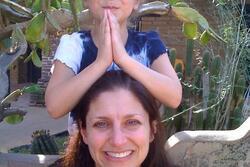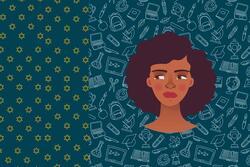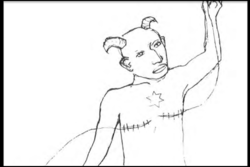The Future of Gendered Hebrew
My family are Cohanim, meaning we are descended from a long line of Jewish priests leading all the way back to Aaron. Or at least, my dad, grandpa, and male cousins are Cohanim. In many sects of Judaism my sister and I are referred to as bat Cohanim, or daughters of priests. To these groups, we will not pass on the Cohen designation to our children (unless, of course, we marry a male Cohen). This language effectively designates us as objects: we are secondary to Cohanim, not worthy of the title itself.
My sister and I had bat mitzvahs when we were thirteen. When my dad, grandpa, and male cousins were thirteen, they had bar mitzvahs. Bar is the Hebrew word for son, and bat is the Hebrew word for daughter. Even though they're both little words, the designation of bar and bat largely divides people into two boxes.
Both the way Cohen lineage is designated and the distinction between bar and bat mitzvahs show issues with the language that we use as Jews. The first example shows a gender disparity, as women aren't allowed (by some) to have the same titles as men. It also illustrates that patriarchy exists not only systemically but also in the way we structure our language. The second shows a gender binary issue. By using only the words '”bar” and “bat,” we exclude many people of other genders.
Both of these problems are caused simply by the words that we choose, the way that we speak. These two issues, to me, have the same solution: a move towards more inclusive religious language, as everyone should feel safe in the sanctuary. Speaking with intention is important, and it is even more important in spaces where language plays a large part. So, to solve these issues, we can look at both the language we use in religious ceremonies, and the Hebrew language itself. Secular Hebrew does influence our community, and we can do better to address the prevalence of patriarchy.
Hebrew is a gendered language. Nouns are either masculine or feminine, and there isn't really a way to address gender-non-conforming individuals. To address a crowd of mixed gendered individuals, it is linguistically correct to use male pronouns. As Hebrew is considered the language of the Jewish people, the original language of the Bible, and the language of Israel, there is no disentangling the language from religious ceremonies. However, this fosters a culture of exclusion and denies people safety and belonging. Thus we must look to solutions: how can we make this language better for all?
First of all, some Hebrew speakers elect to use only the feminine form when they speak, or to switch between the feminine and masculine when addressing crowds. This addresses the misogynistic imbalance in the language to some extent. Additionally, students and faculty at CU Boulder have created a new set of Hebrew language rules to accommodate non-binary Hebrew students. This is one of many projects to create alterations to the Hebrew language. Projects like these are facing pushback in Israel and in more conservative sects of Judaism, but as we progress into new generations, I have high hopes that they will begin to take hold. Hebrew is a living language, and I believe that it will learn to adapt and grow as we do.
A more inclusive modern Hebrew would address many problems with the religious language that we use, but it's also important to look at biblical Hebrew used in services. In June 2022, the law committee of the Conservative Movement approved an opinion providing gender neutral options for Torah service honors, including aliyot, hagbah, and gelilah. For example, instead of the words “ben” and “bat” (son and daughter, respectively), words like “m'beit'” (from the house of) can be used. This way, everyone granted the honor of being called to the Torah can be identified in a gender-neutral way
So why should we implement these solutions? Hebrew is 3,000 years old. Why should we change it now? To put it simply, if we want Judaism to be a safe place for everyone, and to be able to love our neighbor as ourselves, we should seek to reflect that within the language that we use. Language is power. It influences culture, behavior, psychology, and almost everything else. Secondly, gender-non-conforming identities aren't a new concept, not in the history of the world, and not in Judaism. The Talmud recognizes eight genders, and even suggests that the first human was neither male or female. It's important that we speak with the intention to include everyone, especially because this is not new to our community. The next time you attend a service or a ceremony, try to count how many gendered words are used, how many times a gender-non-conforming person might not fit into terms that are used, how many times terms are used to perpetuate patriarchal ideas. In the same way Hebrew is a living language, I believe that Judaism is a living religion, and therefore can grow to encompass and include everyone.
This piece was written as part of JWA’s Rising Voices Fellowship.







